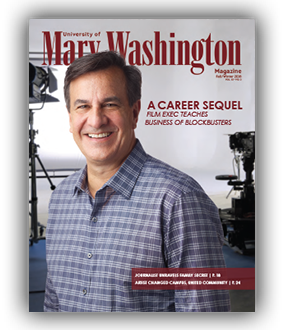
Willie Lee Nichols Rose ’47
By William B. Crawley Jr.
The University of Mary Washington lost one of its most distinguished alumni on June 20, 2018, with the death of acclaimed historian Willie Lee Nichols Rose ’47.
Born in the southwestern Virginia community of Moneta, Willie Lee Nichols was reared in nearby Bedford. Having graduated from Mary Washington at the age of 20, she married William G. Rose, a mechanical engineer and photographer, in 1949. After teaching high school English and history for several years, she enrolled at Johns Hopkins University, where she earned a doctorate in history in 1962. Two years later, she joined the faculty at the University of Virginia, where her impact on the historical profession was immediate, profound, and far-reaching.
The book that catapulted Rose to the forefront of American historians was titled Rehearsal for Reconstruction (1964). In that study of the community of Port Royal, South Carolina, where slaves gained their freedom in 1861, she argued that blacks had already demonstrated the capacity for self-government long before the Civil War ended.
Such an unconventional thesis departed starkly from the long-prevailing conventional assumption – that the ineptness of freedmen and their manipulation by so-called carpetbaggers and scalawags contributed to a catastrophic period of Reconstruction. Rose’s findings indeed sparked the beginning of a markedly different interpretation of that period, a view that prevails to this day.
The book won instant acclaim among scholars, receiving the Francis Parkman Prize for the year’s best book on American history.
Rose’s eminent status among her peers provided a platform from which to pursue one of her major concerns: the need for greater representation of women in the historical profession – a view vigorously championed in a report by an American Historical Association commission that she chaired in 1970.
Other notable accomplishments and accolades followed, as she moved in 1973 from U.Va. to Johns Hopkins. She was, for example, the first woman to be appointed to the prestigious Harmsworth Visiting Professorship in American History at Oxford University in 1976. The following year, she published a comprehensive volume titled A Documentary History of Slavery in North America.
Then, in 1978 at the age of 51, at the peak of her career, she suffered a debilitating stroke. Though she continued on the Johns Hopkins faculty until retirement in 1992, her teaching capacity was significantly diminished and her scholarly output was limited to one collection of essays, speeches, and reviews titled Slavery and Freedom (1982), edited by her Johns Hopkins colleague William Freehling.
At the time of her passing, Rose was 91. Her closest surviving relatives were her niece, Vickie Nichols Sherertz ’78, and a nephew.
“Up until her death … Willie Lee fought every day to learn to read and write again.” Sherertz said. “I chose to attend Mary Washington primarily because of her passion for the college.”
In her brilliant albeit too brief career, Willie Lee Rose left a lasting legacy, both as a pioneer in modern Reconstruction historiography and as an advocate for women in academia.
Yet there was also an additional personal dimension that will long be recalled by those who, like me, had the good fortune to be among her students. Within my graduate student cohort at U.Va., Professor Rose was universally admired – by all odds the most beloved member of the faculty (and, tellingly, its only female). Diminutive and demure, this soft-spoken Southern lady – yes, lady – presented lectures characterized by brilliant and often provocative insights, typically delivered with unpretentious warmth. It was a privilege to have been associated with this remarkable woman and scholar, whose example has remained with me throughout my career at her alma mater.
___________
Distinguished Professor Emeritus of History William B. Crawley Jr., was a member of the UMW history faculty for more than 40 years, during which time he won awards for outstanding teaching and held a number of administrative positions. He is the author of a biography of 20th-century Virginia politician William M. Tuck, Bill Tuck: A Political Life in Harry Byrd’s Virginia. He also wrote The Centennial History of the University of Mary Washington.
